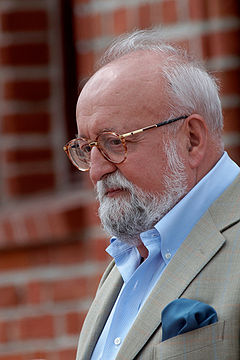Dutoit leads CSO, soloists in compelling Penderecki premiere

Charles Dutoit has settled into a comfortable niche as one of the Chicago Symphony Orchestra’s most popular guest conductors and once again the Swiss conductor provided strong, incisive advocacy in the opening program of his two-week CSO stand Thursday night.
Dutoit led the 2001 world premiere of Krzysztof Penderecki’s Concerto grosso for Three Cellos and Orchestra in Tokyo in 2001, so it was entirely apt that he be on the podium for this belated CSO premiere.
Penderecki made his mark on an unsuspecting world in 1960 with the explosive Threnody for the Victims of Hiroshima, followed by other works in an envelope-pushing avant-garde style. After a period of blocked creativity, the Polish composer began a second career as conductor in the 1970s, returning to composition with music that had grown more tonal and conservative.
Still, despite the Baroque implications of its title, the Concerto grosso inhabits a decidedly 21st-century world. Penderecki may have toned down some of his more outré avant-garde elements, but this is hardly soft or squishy, eager-to-please Neo-romanticism.
Penderecki’s Concerto grosso is a descendant of the Baroque form only in that the three soloists are coequals with the souped-up orchestra. Scored for large forces with ample percussion battery, this is dark and brooding music with the orchestra representing a restless, roiling backdrop to the three soloists. There are bursts of agitated bravura from the individual solo cellos but their music is largely subdued. Reflective solo passages mostly alternate with surging, violent outbursts from the orchestra, not least a massive, malign march for cellos, basses and percussion.
Yet for all the restless noise and thunder there are notable moments of lyric beauty with some of the nostalgic solo moments for the three cellists—overlapping and individually—among some of Penderecki’s most indelible inspirations. The composer deftly manages to sustain variety among the soloists and overall interest in a stark and compelling single unbroken movement of 35 minutes. (Note: Penderecki himself will conduct this same work July 15 and 16 at the Grant Park Music Festival.)
Much credit must be given to the impassioned and communicative soloists, CSO members John Sharp, Kenneth Olsen and Katinka Kleijn who were warmly applauded by their colleagues and the audience. Dutoit drew powerful and full-tilt support from a clearly responsive orchestra. Specials kudos to the percussionists, not least Cynthia Yeh whose lightning marimbaphone solo was dazzling by itself.
Two Romantic warhorses flanked the Penderecki premiere.
Sir Edward Elgar would go on to write greater works than his Enigma Variations, notably the violin and cello concertos and two symphonies. Yet his Variations on an Original Theme—which put his name on the map—remains remarkably fresh and imaginative in its clever musical portraits of the English composer, his wife and several friends, in variations by turns, witty, confident, and deeply felt.
Dutoit is an Elgarian in the big-boned tradition eliciting a boldly projected performance with sumptuous textures. What wasn’t always apparent Thursday night was the music’s charm and piquant humor with Dutoit’s weighty approach to the slower variations rather massive and Teutonic.
That said all the major variations came off well with a rollicking Troyte, an affectionate Dorabella and a spacious, warmly moulded Nimrod, building from near-silence–coughers apart–to a resplendent climax.
The evening led off with a notably brassy and exuberant account of the Roman Carnival Overture, amazingly for such a popular work, its first downtown hearing in 11 years. The CSO served up both elegance and blazing dynamism under Dutoit’s direction, with Scott Hostetler contributing an eloquent English horn solo.
The program will be repeated 8 p.m. Saturday and 7:30 p.m. Tuesday. cso.org; 312-294-3000.
Posted in Uncategorized


